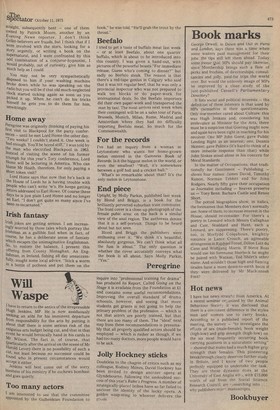Book marks
George Orwell, in Down and Out in Parts and London, says there was a time when some waiters paid management for their jobs: the tips still left them ahead. Today some swear at MPs should pay likewise, since Membership brings such a flow of perks and freebies, of directorships, consultancies and jolly, paid-for trips the world over. But would the unlovely image of MPs be improved by a close study of the just-published Cassell's Parliamentary
Directory? It lists social and political interests — the
definition of these interests is that used by MPs themselves in their questionnaires. Only one member cared about Culture: this was Hugh Jenkins and, considering his irrelevance as Minister for the Arts, there must be a suspicion that Goering might now and again have been right in reaching for his revolver. One MP John Gorst, gave Public Lending Right as an interest; one, Dennis Skinner, gave Politics (it's hard to think of a more imbecile response than that) while John Stokes stood -alone in his concern for
Moral Standards. In the matter of Occupations, that tradi
tionally for Gentlemen — Publishing — shows four names: James David, Timothy Raison, Norman Tebbitt and Sir John Rodgers. Nearly fifty gave their occupation as Journalist including — heaven preserve us — Tony Benn, Barbara Castle and Renee
Short.
The potted biographies show, in italics, the forenames that Members don't normally use. Some of them, to increase interest in the House, should re-consider. For there's a poetry in Leonard which Messrs Callaghan
and Carr, Stoddard and Hunt, each a Leonard, are suppressing. There's poetry,
too, in Morfydd Colquhoun, knightly romance in Lance Crouch, an agreeable strangeness in Raphael Freud, Dillon Lott du Cann and Wolfgang Morris. If Steve Ross would use his forename Sherlock he might be paired with Watson, Ted Short's other name. And wouldn't those high and flaming tirades have a more down-to-earth basis if they were delivered by Mr Mackintosh Foot?
Hot news I have hot news straight from America. At a recent seminar orsanised by the Animal Behaviour Society it was disclosed that there is a consistent difference in the styles men and women use to carry books. According to a published report of the meeting, the survey — "to investigate the effects of sex (male-female), book weight (high-low) and grip strength (high-low) on the six most frequently occurring book carrying positions in a naturalistic setting" — showed that males had a much higher grip strength than females. This pioneering breakthrough clearly deserves further study in Britain, and I know of two people perfectly equipped to undertake the task. They are those dynamic dons at the University of East Anglia wh with £15,000 worth of aid from the Social Science Research Council, are rssearching into . . why publishers rejert manuscripts.
Bookbuyer


































 Previous page
Previous page